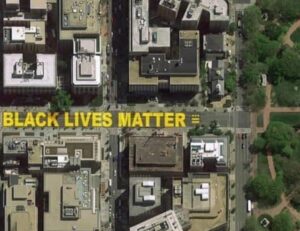Black Lives Matter D.C. vs. Trump
 On June 4, 2020, as peaceful racial justice protesters were at Lafayette Square Park outside the White House protesting the killing of George Floyd and demanding greater accountability for our nation’s law enforcement personnel, they were assaulted with tear gas, rubber bullets, clubs and shields to clear the way for a photo-op for former President Trump.
On June 4, 2020, as peaceful racial justice protesters were at Lafayette Square Park outside the White House protesting the killing of George Floyd and demanding greater accountability for our nation’s law enforcement personnel, they were assaulted with tear gas, rubber bullets, clubs and shields to clear the way for a photo-op for former President Trump.
The Lawyers’ Committee for Civil Rights Under Law, the Washington Lawyers’ Committee for Civil Rights and Urban Affairs, the Washington, D.C. chapter of the ACLU and Arnold & Porter LLP immediately filed a lawsuit against former President Trump, former Attorney General William Barr and several other government officials for their actions.
The lawsuit claims that Trump, Barr and the other defendants had no legitimate basis for assaulting the peaceful protesters and that they conspired to violate the First and Fourteenth amendment rights of the protesters. The lawsuit also states that the violence the protesters were met with is a continuation of the United States’ history of oppressing civil rights activists. The case was filed in US District Court for the District of Columbia.
Over several months, defendants have filed motions to dismiss the case. The Lawyers’ Committee and co-counsel immediately filed oppositions to the motions to dismiss, arguing that the perpetrators of the state-sanctioned violence must be held accountable for their actions.
A host of Civil Rights Era veterans, Reconstruction Era Historians, human rights experts and legal scholars have also filed amicus briefs in support of holding the government officials and law-enforcement accountable for their actions.
The brief from the Civil Rights Era veterans asserts that the Movement for Black Lives builds upon the legacy of the 1960’s Civil Rights Movement, and demonstrates the similarities between law enforcement violence against Black Lives Matter protesters law enforcement violence against civil rights protesters in the 1960’s. A brief from Reconstruction Era legal historians discuss how the Ku Klux Klan Act of 1871 was passed to specifically address the sort of government-sanctioned violence against civil rights protesters that was witnessed in this case. A brief from legal scholars addresses how, going all the way back to colonial times, courts have held government officials personally liable for violating fundamental rights. Another brief from human rights experts argues that the Defendants violated international human rights law.
The case is still before the US District Court for the District of Columbia and has not been heard yet.
Key Documents:
- Lawsuit
- Motion to Dismiss from former Attorney General William Barr
- Motion to Dismiss from Former President Trump
- Motion to Dismiss from the Metropolitan Police Department
- Opposition to Motions to Dismiss
- Amicus Brief of Veterans of the Civil Rights Era
- Amicus Brief of Reconstruction Era Legal Historians
- Amicus Brief of Human Rights Experts
- Amicus Brief of Legal Scholars on Police Accountability
